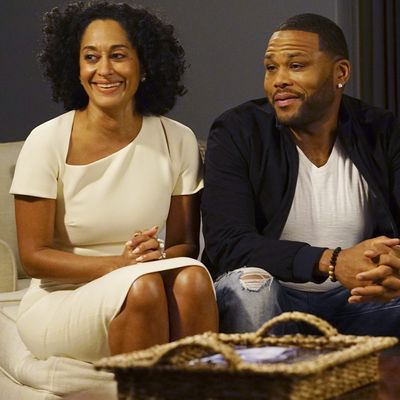
In “The Johnson Show,” Black-ish addresses the legacy of The Cosby Show while carefully dancing around the rape accusations against Bill Cosby. The comparisons between the two shows remain, despite the distance Black-ish deliberately builds between them. Yes, both are sitcoms about black families, led by husband-and-wife duos with good educations and careers, but Black-ish never shies away from mentioning race or current hot topics. When Dre talks about the influence The Cosby Show had on his life, he’s mirroring the experiences of showrunner Kenya Barris.
As the episode opens, Stevens & Lido have begun company layoffs. It seems Daphne is flexing her 51 percent ownership to make a lot of changes, including a possible name change for Lido’s Place, which Mr. Stevens says sounds like a place that serves two-for-one Michelobs. Dre wants Mr. Stevens to guarantee he won’t be laid off, but Mr. Stevens already used his pull to keep Javier, the janitor who knows how to remove blood from marble. It’s a blow to Dre’s ego that he isn’t more important than a company janitor.
Dre immediately tells Bow about the pending layoffs and how he’s not sure what it all means for him. Bow is confident they’ll get through okay; if he does get fired, she makes enough to cover the family until he can get back on his feet. Dre being upfront and honest about his work situation is a sign of both maturity and trust. He didn’t try to hide the news until it was too late, and now, they can prepare for any situation together. Unfortunately, Pops thinks the idea of Bow becoming the breadwinner will put too much strain on their marriage. He reminds Dre that when Ruby started earning more money, it ended their relationship — but as Dre suggests, Pops’s constant cheating certainly played a bigger role.
Back at work, Dre tries to prove his worth to the company by showing how much money his urban division brings in. His bubble bursts when Mr. Stevens points out that the urban market has become the market, period. “The day I learned what ‘on fleek’ meant is the day that the urban market was no longer ‘on fleek.’” Perhaps most illustrative of Mr. Stevens’s point is the Hamburger Helper’s Twitter account, which is full of puns based in hip-hop and black slang. In Spotify commercials, people who are supposed to sound young and hip compliment each other with popular black slang. Certain hairstyles get advertised as the latest hot trend, although they’ve been popular in black communities for years. So many aspects of black culture were once dismissed, but have now become firm anchors of popular culture.
While Dre tries to prove himself, Bow faces a tall task of her own: running the school auction. She wants to do a good job, if only to prove that she’s a working mother who has it all together. She refuses to ask for help from the other mothers, fearing that it would show weakness. Instead, she asks the kids to help her prepare the baskets, which will include donated gift cards. Too bad Ruby assumes that no one ever uses gift cards, then begins stealing them and putting them back after spending all of the money on each one. Soon enough, she encourages the kids to do the same.
The auction goes well until Dre finds out about the empty gift cards. Bow’s dreams of impressing everyone are going up in smoke. Dre’s hopes of proving that the Johnsons are a good, successful black family also disappear. He grew up watching the Huxtables, so it means the world to him that his family breaks stereotypes. Now facing the possibility of a jobless future with his children exposed as thieves, he’s upset that people will only reinforce stereotypes. Bow understands what Dre is going through, if not moreso because she is a black female doctor. People expect her to mess up.
It calls to mind a scene from Scandal, in which Olivia Pope’s father reminds her of a tough lesson: To get half of what white people have, black people have to work twice as hard. Dre’s frustration is an echo of that sentiment. When Pops dismisses The Cosby Show as make-believe, Dre doesn’t care. The show was fake, but the dreams it inspired are real. The accusations against Cosby are also real, and at the very least, add an enormous asterisk to the show’s legacy. Dre reminds us that black people get so few chances that their mistakes can mess things up for everyone after them. Nevertheless, Dre hopes that his real life can be better than the dreams of his childhood. He disciplines Ruby and the kids by taking their electronic devices, then decides to put in more time at work.
Meanwhile at Stevens & Lido, even more changes are coming. Daphne bought the controlling interest in another company, which means S&L will absorb the employees of the new acquisition. Guess who’s back? Charlie! Here’s hoping he’s back for good.
Though it took awhile to reach the payoff of Ruby turning the children into thieves, it’s satisfying to see how “The Johnson Show” connects that story line to Dre’s fears of people measuring his family against stereotypes. Black-ish has pulled back the curtain on a lot of issues that black families face — the sort of issues that don’t go away with money. There are still concerns about stereotypes, job security, and proving yourself worthy of what you have. “The Johnson Show” cannily addresses this through Black-ish’s relationship with The Cosby Show, ultimately suggesting that the work of a flawed artist can still inspire a person to achieve his goals.

